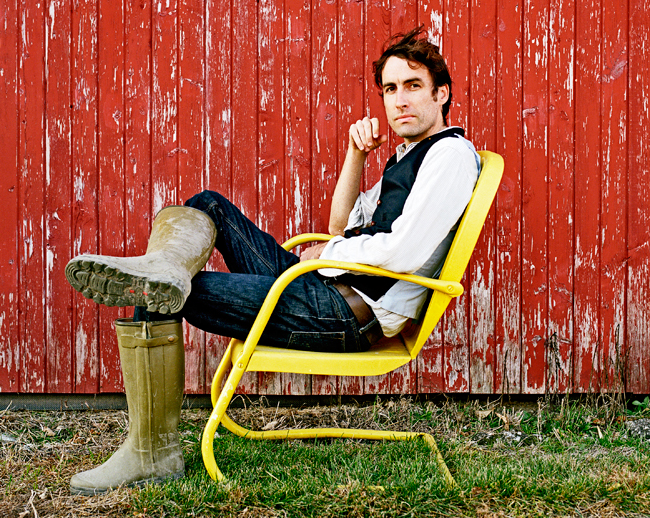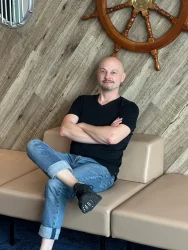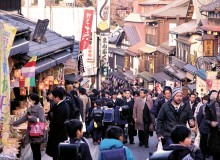
January 21, 2010
Andrew Bird
In his first visit to Japan, the Chicago avant-popster is, in a sense, coming home
By Metropolis
Originally published on metropolis.co.jp on January 2010

Photo Courtesy of Smash
One of the (few) fun things about doing telephone interviews with touring artists is finding out where they are and what they’ve been doing. When I catch up with Andrew Bird, the multi-instrumentalist is recuperating at a Madrid hotel after flying in from a Polish jazz festival the night before.
“We ended up at a place called Carpe Diem at 3am—it smelled like a locker room but with lots of cigarette smoke. It was really bizarre,” he says with a laugh. “I wasn’t sure if I was down with it all, but it was a cultural experience.”
A composer of cerebral folk-tronica who augments his guitar and vocals with violin and glockenspiel, Bird doesn’t seem the type to top off a gig with a night of hedonism. But first impressions can deceive.
“It doesn’t mean being puritanical,” he answers when asked how he recharges his batteries on tour. “Sometimes, it means blowing it out every couple of days and staying up all night and getting rid of stress. But you do become hyperaware of what you’re putting into your body and who you interact with.”
Bird built up his endurance during his time as a cog in the hyper-competitive classical-music prodigy machine. In fact, years studying the violin with Japan’s legendary Suzuki Method make his upcoming Japan debut something of a spiritual homecoming.

Photo Courtesy of Smash
“In the ’70s, the American suburbs were going crazy for Suzuki,” the 36-year-old says. “The whole bowing and ceremonial repetitious thing was a weekly thing for me from age 4 to 12 or 13. We would go to a summer camp, and Doctor Suzuki would come, and there would be 1,500 kids in a gymnasium bowing to him. Having grown up playing Suzuki and with a lot of Japanese-American kids—many of them friends—I’m very interested to finally be going to the origin of that.”
Bird graduated from Northwestern University with a degree in violin performance in 1996, but opted to pursue pop instead of classical. After several years as a journeyman violinist with groups like the Squirrel Nut Zippers and his own Bowl Of Fire, Bird finally found success in the middle of the decade as a solo act.
A series of albums, beginning with Weather Systems (2003) and running through The Mysterious Production of Eggs (2005) and Armchair Apocrypha (2007), saw him employ loop samplers to create the lush orchestrations that only an expensive backing band could provide. He uses layered violin loops as a canvas for verbose meditations on life and the world around him. Sporadic colorations with the glockenspiel, his trademark whistle, and super-literate lyrics make Bird’s music instantly identifiable.
“I relish the conversations I have with people and hearing about their history and how they fit in with the deep interconnectedness of human civilization,” he says. “I could name at least a dozen songs I’ve written that have to do with my experiences traveling. You write what you know—and what I know is being in a different country or city every day, and waking up from a nap on a vinyl couch in a club somewhere in a daze, but with a strange clarity of perception.”
Bird’s songs have the remarkable ability to connect historical panoramas to intimately personal issues.
“I like to use stark contrasts within songs, and natural history or biology and history give me very rich metaphors for things that are actually quite everyday and personal,” he explains. “They also just happen to be stuff that I’m turned on by. The songwriting process is about trying to escape everyday, matter-of-fact language that seems so overused and exploited, and looking for things outside the vernacular to find value again.”
Bird makes no apology for being an “ideas man” in a frequently idiotic popular culture. Judging by the fact that he’s been well received on TV shows like Late Show with David Letterman and on the big stages of festivals such as Coachella, too, there may still be hope for Contemporary Civilization.
“Sometimes I get accused of being obscure or erudite or whatever, but you know, it’s poetry,” he says. “You’re trying to find things that sound beautiful and mean something at the same time. And that’s a tall order.”

Photo Courtesy of Smash
Andrew Bird
American neo-folk singer-songwriter and musical polymath. Feb 3, 7pm, ¥5,000. Club Quattro, Shibuya. Tel: Smash 03-3444-6751.
Noble Beast is out now on Hostess.







